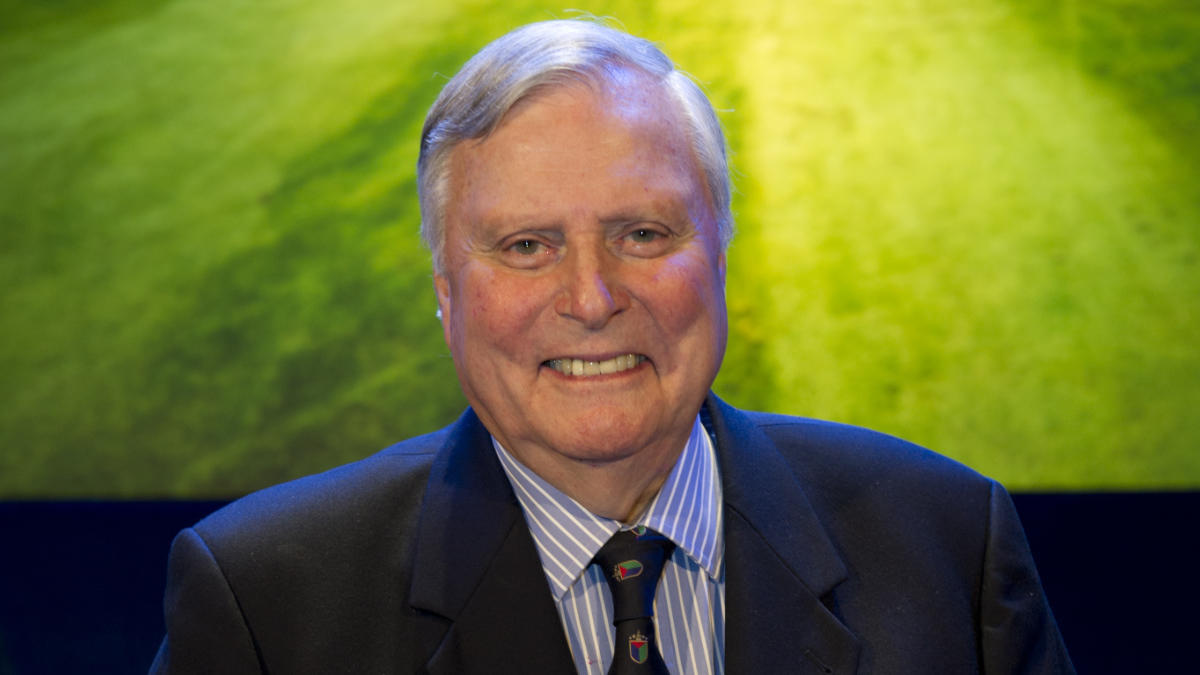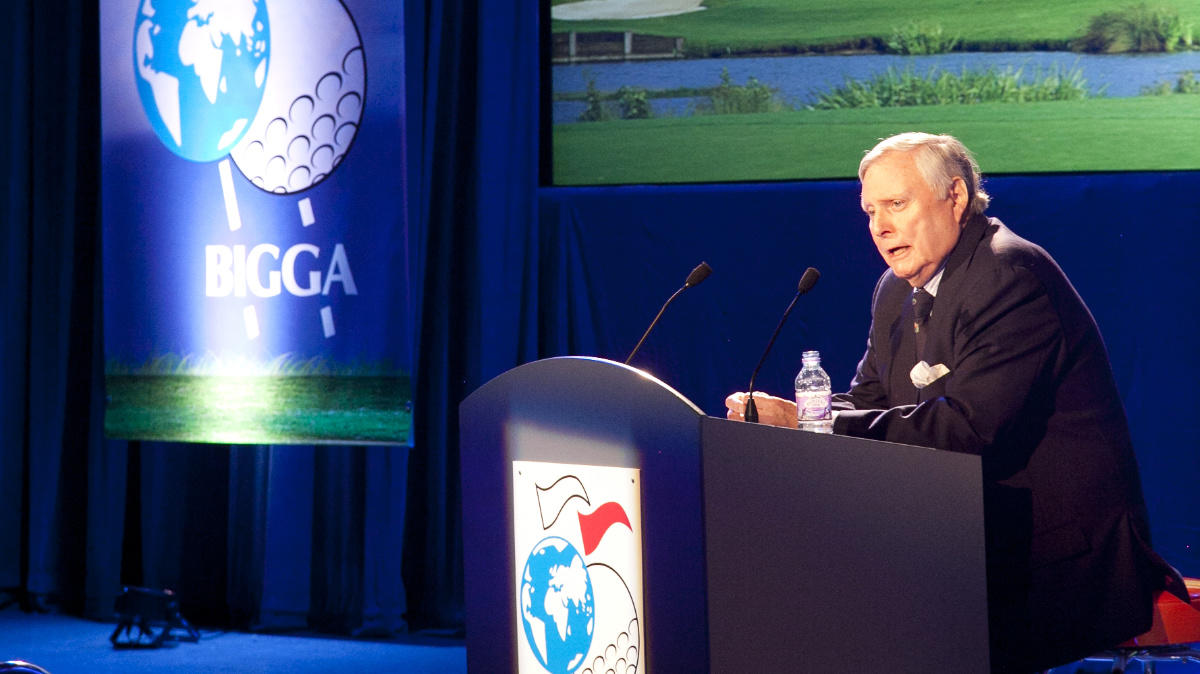- Homepage
- News and Features
- BIGGA mourns passing of former president Peter Alliss
BIGGA mourns passing of former president Peter Alliss

BIGGA is today mourning the death aged 89 of Peter Alliss, the legendary golfer and commentator who acted as president of the Golf Greenkeepers Association and then British Golf Greenkeepers Association from 1979 to 1986.
The GGA and BGGA were predecessors of BIGGA, formed in 1987, and Peter retained a close association with the greenkeeping industry throughout the remainder of his life.
Speaking in 2005 to Greenkeeper International, the monthly publication for BIGGA members, Peter said: “It’s a hell of a job for greenkeepers. It’s not a thankless task as it is very rewarding but I don’t think in all honesty enough good greenkeepers get enough praise. They are the hub of any club.
“[If I was running a golf club] I’d try to get the very best greenkeeper I could, but also the best steward; the best cook – you don’t want a chef; a good secretary; a good pro and a good assistant. If you’ve got all those ingredients it will work. The course can be very ordinary but if you keep it neat and tidy with a good attention to detail people will say how nice it looks and keep coming back. It’s like having a cheap pair of shoes, if they are clean and looked after they will be fine but if they are dirty and neglected they will look awful.”
For most today, it is in his role as lead golf commentator for the BBC that Peter is most fondly remembered, and his famous voice was heard at the BIGGA Turf Management Exhibition in 2014, when he delivered the key note speech.
BIGGA CEO Jim Croxton paid tribute to Peter and said: "Like all golfers Peter Alliss, the Voice of Golf, was the backdrop to my whole life watching the sport. It was a great thrill to meet him occasionally in the course of my career and he was a fantastic supporter of greenkeepers throughout his time behind the microphone.
"When he spoke at our Welcome Celebration in 2014 he was just extraordinary. He sat right in the wings beside the stage throughout the whole show as he was struggling to walk and didn't want to have to hobble too far at the appropriate time. When I introduced him he said 'how long do you want?' I said 20 minutes and he did it almost to the second with no breaks or checking of his watch, it was masterful.
"He left me a voicemail after the Welcome Celebration, thanking us for having him. It was amazing to hear that voice on my own phone and I listened to it numerous times. Peter will be sorely missed and the thoughts of everyone involved with the association goes out to his family at this time."
Quoted in the February 2014 edition of Greenkeeper International, Peter said: “I have a special affection for greenkeepers. The greenkeeping world is a very different world now and I marvel at the technologies now used. It never crossed my mind your profession would grow as it has and even cutting the hole on the greens is very different now.
“I congratulate you all. It’s a very worthy profession and your world is one which I still take an interest in. If you go to a golf club you can see if those in charge care and it’s the little details that make a difference. At the end of the day it is the golf course itself that makes a club successful.
“I wish you well in all you do because the game of golf has been my world. It’s been a wonderful life and you have helped create that. I hope it doesn’t get too sophisticated, that everything is done with [machines]. I still think there is room for the craftsman who knows a particular area and how it works."
As a player, Alliss won 31 tournaments and he and his father Percy were the first father-son duo to compete in the Ryder Cup, when it was a contest between Great Britain and the United States.
In his address upon being re-elected as president of the association in 1982, Peter spoke about his particular dislike for daisies on fairways, but also addressed the more serious issue of the poor working conditions encountered by greenkeepers.
He said: “[The presidency of the association] is a position I regard as extremely important in the international world of golf and an office I am proud to hold. My main role, as I see it, is to try to stimulate interest and enthusiasm within the world of golf from the platform of television and writing. No-one more than I realise that most working conditions for greenkeepers are far from satisfactory. Although appalling might be too strong a word for some of the conditions, primitive certainly is not. The majority of clubs cannot afford to lash out hundreds, nay thousands of pounds for their greenkeeping staff, but it has always been my experience that most golf clubs do not budget enough for the actual maintenance of the golf course. This I believe is very narrow thinking.
“Once you have the reputation for keeping the course neat and tidy people will say ‘I like to play at such and such a course, it’s no great test, it’s a bit hilly or it’s a bit flat, but it is always in such good condition.’
“Golf clubs and the committees that run them need to take a serious look at the state of their courses, the working conditions and remuneration of their employees and methods of improving both to the benefit of all. There are all types of schemes that clubs could introduce and put into action now, particularly with regard to pensions, insurance and improved working conditions.”

Peter’s voice continued to be heard on our television screens right up until his death and he was a part of the commentary team for the November 2020 US Masters. In 2005, then Greenkeeper International editor Scott Macallum spoke to Peter about Augusta National and the problem of comparing the famous course to the ones played on by club golfers around the UK.
“For people to think that their own courses should be like Augusta is like dreaming of living in Buckingham Palace. It is completely unobtainable,” he said. “There is a lot of falseness about Augusta. It’s a bit like preparing for the Chelsea Flower Show, where plants are forced on and arrive in buckets and everyone is desperate to keep the plants alive for a week. A lot of that happens at Augusta where they do supply the rhododendrons and azaleas in pots if the weather hasn’t been conducive to bringing them on, just so that it looks wonderful.
“What people don’t understand, and I’m talking about single figure players, is just how fast the Augusta greens are. Regular club golfers just couldn’t conceive of it.
“The money they spend at Augusta is extraordinary yet they only have 280 members and the course is closed for five months every year. I did see their greenkeeping budget once and it was several million dollars a year, every year.
“From a greenkeeping point of view, when you get members at home who ask why can’t our course be like Augusta, all I can say is that they have no concept of the money that is poured into Augusta every year. They have no concept of the climate, which is awful for the five months the course is closed – the temperature and humidity are unbearable and they actually install fans in the trees to circulate the air.
“I have never found at weed [at Augusta], even in the rough. I used to go looking for them but I’ve given up now. I’m sure you’d have to go 100 yards [off] the property to find a weed. It is just magnificent.
“I’ve said this many times but at least 85% of all members want to arrive at the club when it suits them and walk onto the 1st tee with nobody there. They want 18 holes of golf and then drop into the clubhouse for a quick pint or just go straight back into the car and home. They want the course in good order with nice flags fluttering; nice soapy water in the ball cleaners and all for £400 or £500 a year.
“Then they’ll come to the greenkeeper and ask why the hollow coring must be done the very week when he’s got a week’s holiday. The average member has no conception of being a supporter.
“You produce a wonderful golf course with a par of 70 and people think it’s Mickey Mouse, because it’s only par-70. God forbid if it were to be par-68. But I maintain the most difficult course in the world would be four par-3s between 190 and 225 yards and 14 par-4s at 470 yards long. It would be a par-68 but you could bring Tiger Woods over and he’d go round all day long and not break par.”
Peter Alliss died on 5 December 2020 aged 89.
We'd like to hear your memories of Peter Alliss. Email [email protected] to be featured on next month's Postage Stamp letters page.
Author

Karl Hansell
Karl has been head of communications for BIGGA since March 2016. His duties include editing the monthly Greenkeeper International magazine, in addition to other communications activities for the association.
